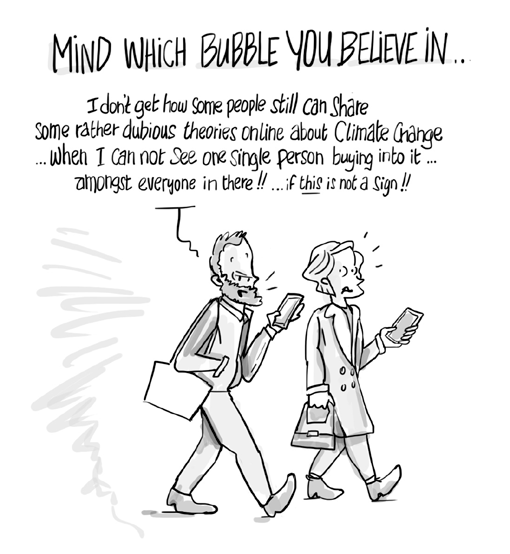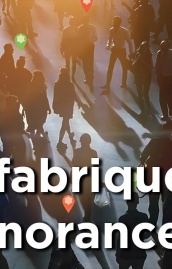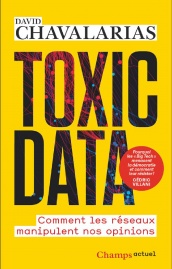Confusion of opinions
Our democraties in jeopardy

"Americans have lost all sense of reality". This is the stark conclusion reached by political scientist and Harvard professor Thomas E. Patterson in his book "How America Lost its Mind". "The corruption of thought, information, and common sense is eroding governing institutions and traditions that took more than two centuries and ten generations of Americans to build" he observes. Unfortunately, this situation is not unique to the United States, but can be seen in all our societies. Our relationship with truth and rationality has been profoundly disrupted, and this is certainly the greatest blow to our democracies. Will it be lethal?
To each their own truth
Fake news are pouring in from all sides. In the age of digital social media, misinformation is spreading atlightningspeed,makingitincreasinglydifficultto distinguish between truth and lies. Research shows that, for a substantial proportion of the population, "fake news" can often be difficult to identify and distinguish from facts. For example, 15% of Americans believe that vaccines for children cause autism, 30% believe that Barack Obama was born outside the United States, or that global warming is a hoax.
Social medias are a fertile ground for conspiracy theories. According to a survey from Conspiracy Watch and Fondation Jean Jaurès in France, only 21% of respondents categorically refused any type of conspiracy theories among the ones submitted to them. For example, almost one in five French people (19%) feel that there are still "grey areas" following the attacks on Charlie Hebdo and the Hyper Cacher in Paris, and that "it is not really certain that these attacks were planned and carried out solely by Islamic terrorists". This figure rises to 27% among the under- 35s, and even reaches 30% among 18-24 year-olds.
The changing media landscape has a lot to do with this. In the quest for survival and relevance, medias adopted business models that are heavily based on web traffic metrics. The shift from print to digital has introduced a data-driven approach, where success is often measured by the number of clicks, 'likes', shares and user engagement.
This means that articles or stories that potentially generate more clicks are prioritised for publication. Thus, the algorithms governing online media platforms tend to favour content that arouses strong emotions, particularly negativity, focusing on conflict, controversy or fear. This production of negative or sensationalist content has become ubiquitous in the media landscape. A study of the campaign speeches of the American presidential candidates shows that the media generally does not cover the proposed political agendas, which make up the majority of the candidates' interventions, but instead chooses to focus on the moments when the politicians vilify each other. A veritable attention race has developed among the media, with each seeking to outdo the others in producing provocative content that elicits intense emotional responses, and unfortunately to the detriment of the democratic process.
Other source of disinformation: influencers. They are now partly substitute to traditional medias among a section of the population that gets their information from these relayers of opinion. As the most hard- hitting publications tend to gain more visibility, they are encouraged to exaggerate, dramatise and simplify their opinions, at the expense of lack of nuance and the truth. Among them are many conspiracy theorists, a preoccupying fact given that the bond created between influencers and their public can create an unwavering sense of trust and loyalty, allowing them to be listened to without any critical thinking.
Some populist politicians are taking advantage of this constant disinformation and disconnect from any form of reality and nuance. Patterson points to a distancing from reality : "Americans’ flight into fantasy has titled our politics in favor of politicians who indulge our capacity for wishful thinking". He finds Donald Trump to be a prime example of this trend : Trump is an expert-of- everything. "I have an instinct," he said. "And my instinct sometimes tells me more than anyone else's brain ever could." To each his own truth. Out with the rationale.
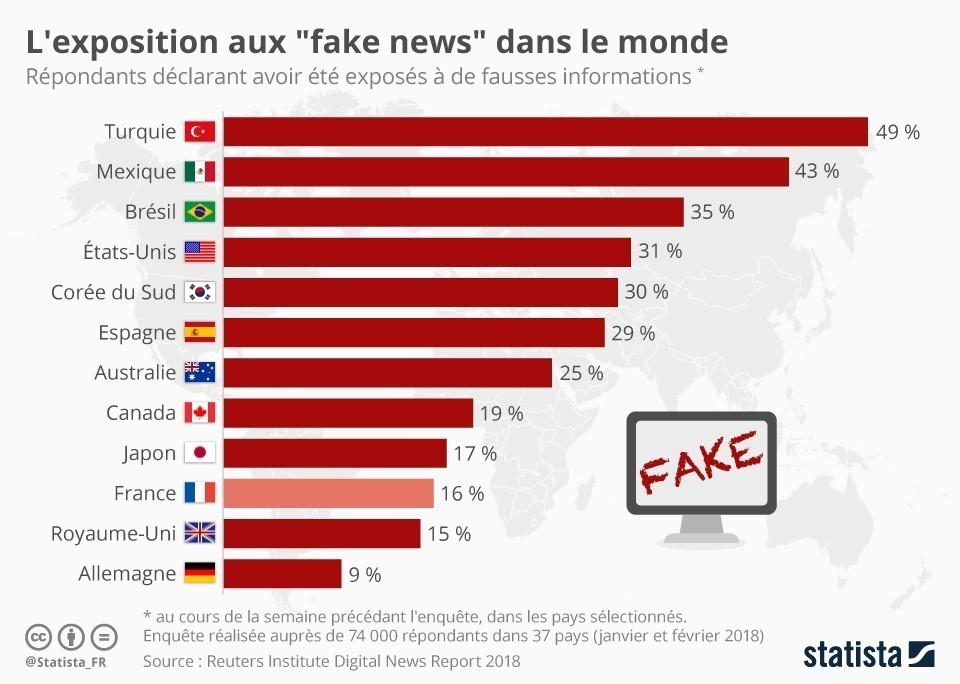
Ideological tribes
The prevalence of filter bubbles, encouraged by algorithms, leads many people to be surrounded mainly by individuals and media sharing and reinforcing their own opinions. Curiously, most of us think we are immune to this reality. According to an Ipsos survey conducted in 27 countries, while two-thirds of those questioned believe that people live in their own Internet bubble, only a third admit to living within one. This phenomenon of digital silos is a reversal of Saint Thomas' dictum to believe only what one sees. We are now inundated with news that reinforces what we already think, with little exposure to new or different ideas: we only see what we believe.
This - coupled with the confirmation bias that encourages us to ignore any information that does not corroborate our opinion - reinforces our beliefs and radicalises them. Logically, we can observe a decline in moderate ideas and an exacerbation of antagonisms. In his book, Patterson notes a widening gap in opinion on various issues: "Over the past few decades, the gap between Republican and Democrats on the issue of legalized abortion has increased by a factor of five. On the question of human-caused climate change, the gap is now nine times greater. In terms of a ban on assault weapons, the divide has tripled."
This polarisation affects all societal issues and is conducive to a climate of political violence. Patterson notes that, compared with 1980, twice as many partisans today have a strongly negative view of the opposing party. Worse still, a growing number of Americans hate the opposing party more than they like their own party. The situation is similar across the pond. All over the world, seeds of violent opposition are sown.
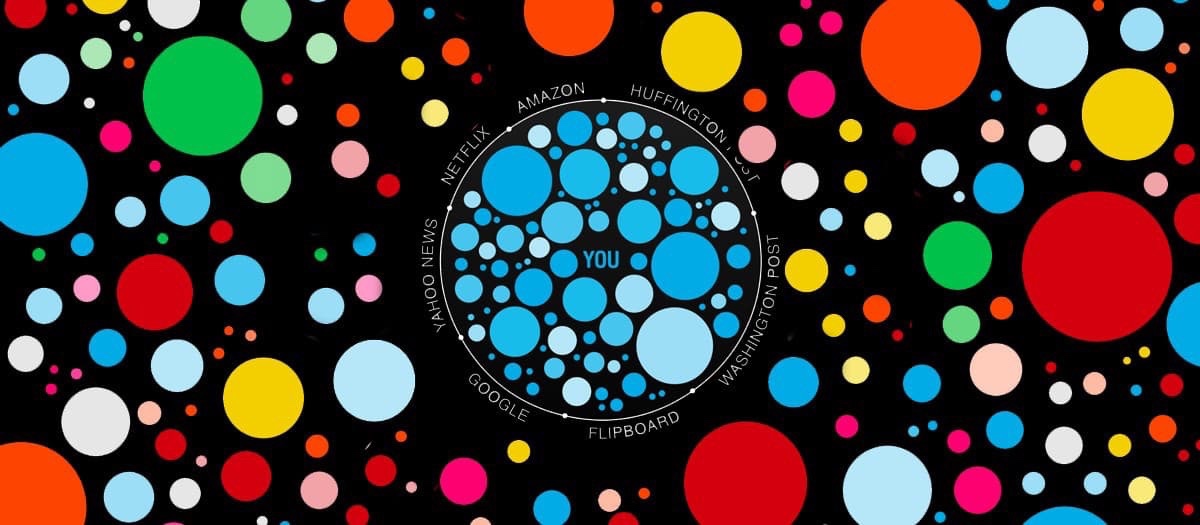
2/3 of people think that people are living in their own Internet bubble, but only 1/3 admit to being part of it (IPSOS).
Widespread mistrust undermining our democracies
Our society is experiencing a major crisis of trust. Scepticism is widespread: institutions, politicians, the media... there is no word that is not called into question, no actor whose malice is not suspected. Science, traditionally seen as a guarantee of truth, is also being challenged. According to the Ipsos survey for The New York Dialogues, 50% of the French population believes that a specialised scientist demonstrating a fact does not guarantee its validity. What's more, 40% say they trust personal experience more than scientists' explanations to determine the validity of a fact. Trust is being eroded on all sides, and the democratic system itself is questioned. According to the same survey, before the last mid- term elections, more than 60% of Americans feared that their fellow citizens would base their votes on "false information". Worse still, the results of the ballot box are being directly questioned, even if it means that democracy could be shattered, as illustrated by the storming of the Capitol on 6 January 2021.
While this movement of mistrust has organic causes, it is also fuelled by external factors. This is what the work of David Chavalarias, director of research at the Institut des Systèmes Complexes (Complex Systems Institute) has shown through the study of message exchanges on social networks. For example, observation of certain major fake news emitting accounts shows that they are very active on the many subjects that divide and weaken society : they express themselves on Covid and the dangers of the vaccination policy, then contest global warming, or relay the Kremlin's propaganda... This has aroused the interest of David Chavalarias' teams, who see these activities as "particularly disturbing". Indeed, these web-based techniques are remarkably similar to subversive foreign interference operations. The environment is the perfect subject for this, explains the researcher. "The issue of climate change is one where governments are being urged by a section of the population to take strong measures, involving major changes in the lifestyles of all citizens. Many of them will only accept these measures if they are worth the risk. Instilling doubt and misinformation about the reality of climate change in some communities, while heightening awareness of the urgency of climate change in others, is therefore a highly effective way of destabilising governments by placing them at the centre of contradictory demands from their citizens. Whatever policy is adopted, social revolt is guaranteed." Undermining climate action and the foundations of democracy by fanning the flames of conflicting opinions - it's the same battle.
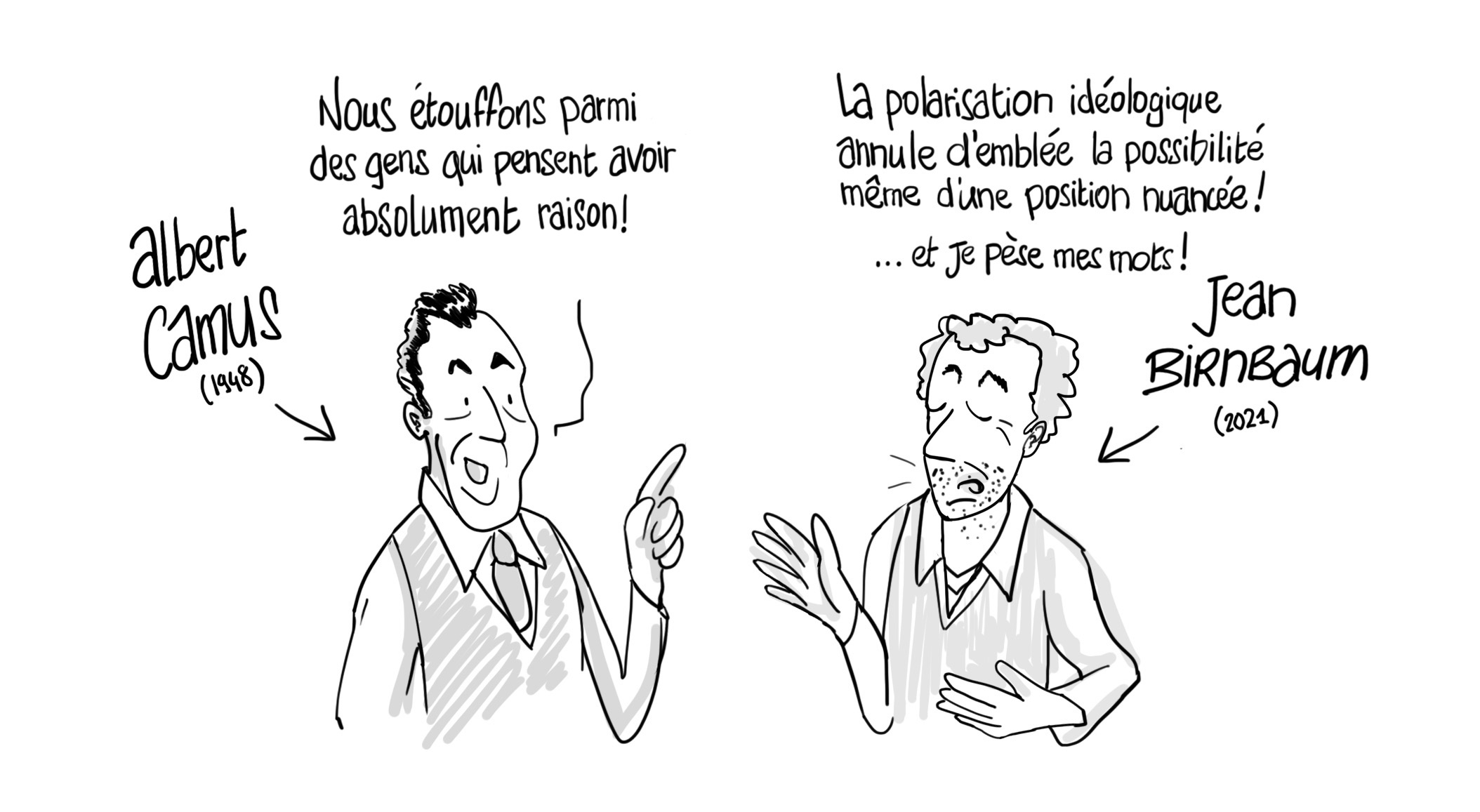
A ceased conversations
Our era is supposedly one of hypercommunication but paradoxically people do not really talk to each other anymore. Communication is either happening inside the filter bubbles or yields place to violence, but occasions of having a constructive exchange, during which diverging opinions can come to understand each other or even converge on certain points, are becoming rare. The reason for this is that there is no more rational common ground between differing positions that could break the tie. The reign of subjectivity has replaced the search for rational truth. In addition, nuance has disappeared. With the polarisation of opinions, it's not in good taste to nuance one's remarks and take into account arguments from the "opposing camp". You have to buy into the whole 'ready-to-think' pack, or risk not being accepted. Debate has been replaced by battle. It's camp against camp, block against block. A binary confrontation like the "like" and "dislikes" on social networks. This extreme polarisation has the scent of a fearsome pre-civil war. This is what Jean Birnbaum denounces in his book "Le courage de la nuance". "Ideological polarisation cancels out the very possibility of a nuanced position". He denounces the current poisonous ideological climate and quotes Albert Camus : "We are suffocating among people who think they are absolutely right". "The air," says Jean Birnbaum, "is now unbreathable".
With the advent of the Internet came the promise of the democratisation of knowledge and the end of ignorance. Above all, it is now a place where the most accurate and the most unsubstantiated exist side by side, a Mecca for the production of untruths. It is the tool that drives mankind back to its old ways. Even if today we live in an accelerated and exacerbated mode, our appetite for fiction has always existed. As Yuval Noah Harari reminds us in his book "21 Lessons for the 21st Century". "Homo sapiens is a post-truth species, whose power depends on creating and believing fictions .../... Homo sapiens is a storytelling animal". Knowing this he appeals to the individual responsibility of each and everyone of us : "We should strive even harder to distinguish reality from fiction. One of the greatest fictions of all is to deny the complexity of the world, and think in absolute terms of pristine purity versus satanic evil. .../... It is the responsibility of all of us to invest time and effort in uncovering our biases and in verifying our sources of information."
The widespread ignorance and doubt running through our society are not a fatality, but rather a consequence of an active cultural production. It is vital to be aware of this tidal wave and to fight against it on a personal and civic level. A relatively recent discipline can help us : agnotology, dedicated to the study of the sociological, scientific and philosophical roots of ignorance. Its aim is to elucidate essential questions so that we can regain an active posture in the face of the information that we receive : What is it that we don’t know ? Why don’t we have access to that knowledge? Let’s remain attentive to what it teaches us.
